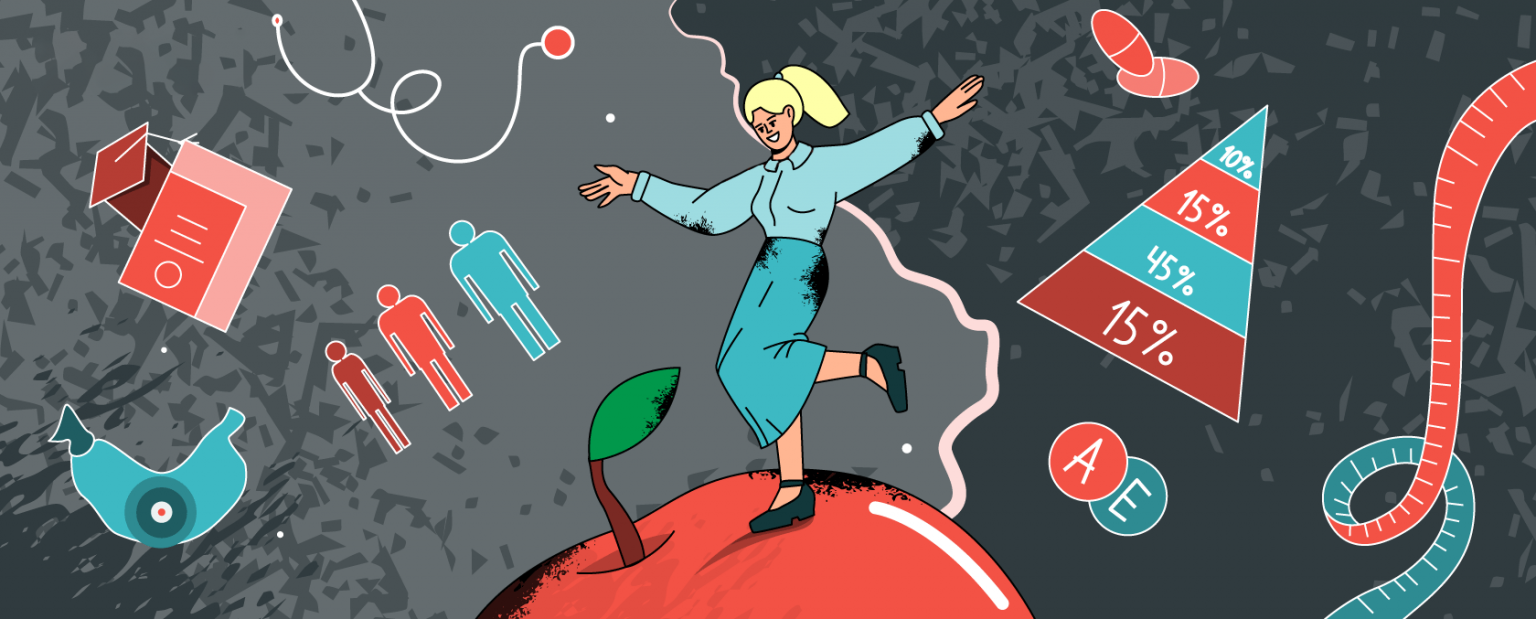Dubai
English
Request a call
More and more people in society are talking about the importance of healthy eating. But how can one make sense of the conflicting advice found online, balance their diet, and truly help their body rather than harm it? This is where the specialist we’ll discuss comes into play.

Dietitian: Who Are They and How Do They Differ from a Nutritionist?
Let’s start with the basics—who is a dietitian? A dietitian is a medical professional with a degree in medicine who has completed additional specialization in dietetics. Unlike a nutritionist, who works with generally healthy individuals, a dietitian is a licensed expert who can treat patients with diagnosed conditions, prescribe treatments, and develop dietary plans for chronic or acute health issues. Typically, general practitioners, gastroenterologists, or endocrinologists refer patients to dietitians, but it’s also possible to seek help directly—especially if you have weight problems, digestive issues, or skin concerns that are not resolved by online diets.What a Dietitian Does: From Diagnosis to Results
Let’s take a closer look at what a dietitian actually does in practice. Their role goes far beyond simply providing a list of foods—they take a comprehensive approach to an individual's health. The process usually includes:- Initial consultation: the doctor gathers medical history, clarifies complaints, lifestyle, and habits.
- Lab tests: hormone levels, vitamin levels, liver and pancreas function are often evaluated.
- Body composition analysis: bioimpedance testing helps assess water, muscle, and fat content in the body.
- Creating a personalized nutrition and lifestyle plan.
- Ongoing monitoring and adjustment of the plan.
Why You Need a Nutritionist: 5 Reasons to Seek Help
If you're still wondering why you might need a nutritionist, here are some situations where their help can be especially valuable:- Weight is "stuck" despite diets and exercise.
- Constant fatigue, skin issues, hair loss.
- Digestive disorders, hormonal imbalances, diabetes.
- Pregnancy, breastfeeding, or preparation for conception.
- Desire to learn mindful eating without harming your health.
What a Nutritionist Treats: Not Just Weight, But Health
It's a misconception that a nutritionist only works with those trying to lose weight. In reality, the range of issues they address is much broader. Here's what a nutritionist treats:- Obesity, underweight, bulimia, anorexia, and other eating disorders. A specialist helps stabilize weight and restore a healthy relationship with food.
- Skin conditions – acne, eczema, psoriasis, rosacea – are often linked to diet and gut health. Adjusting nutrition brings lasting improvement.
- Cardiovascular and metabolic diseases, including hypertension, type 2 diabetes, insulin resistance. A nutritionist helps reduce stress on the body through proper nutrition.
- Allergies, including hidden ones, and food intolerances (like lactose or gluten) – a diet is tailored to avoid irritants.
- Digestive issues: irritable bowel syndrome, gastritis, bloating, dysbiosis. Diet is built on a gentle and restorative approach.

What to Expect During the Appointment: Preparation and Process
At the first visit, the doctor will ask many questions about your lifestyle, sleep, stress levels, diet, and physical activity, and may ask you to keep a food diary for 3–5 days. Based on this information and the results of tests, an individual approach is developed. Additionally, the doctor may recommend:- blood tests for vitamins, iron, and hormones;
- an ultrasound of the gastrointestinal tract or thyroid gland;
- a bioimpedance body composition analysis.
What the Meal Plan Includes: More Than Just a List of Foods
A dietitian doesn’t just say “eat buckwheat”—they create a personalized strategy that includes:- distribution of proteins, fats, and carbohydrates (macronutrients);
- calorie calculation based on goals and activity level;
- recommendations on meal timing;
- advice on correcting vitamin deficiencies;
- a supporting list of acceptable snacks.
Why Do You Need a Nutritionist in the Modern World?
In the age of marketing, trendy diets, and “magic” pills, it’s especially important to have a professional by your side who won’t scare you but will help. Understanding what a nutritionist does means learning to take care of yourself consciously and effectively. A good specialist will always consider not only your goals but also the unique features of your body, which means they’ll choose a path that’s not torturous but supportive. Don’t be afraid to ask questions, seek a second opinion, and move toward better well-being with intelligence and self-care. Our website features the following popular types of services:
Fill out the form to book your consultation.
Your personal manager will contact you within 10 minutes and arrange a convenient time for your visit.












